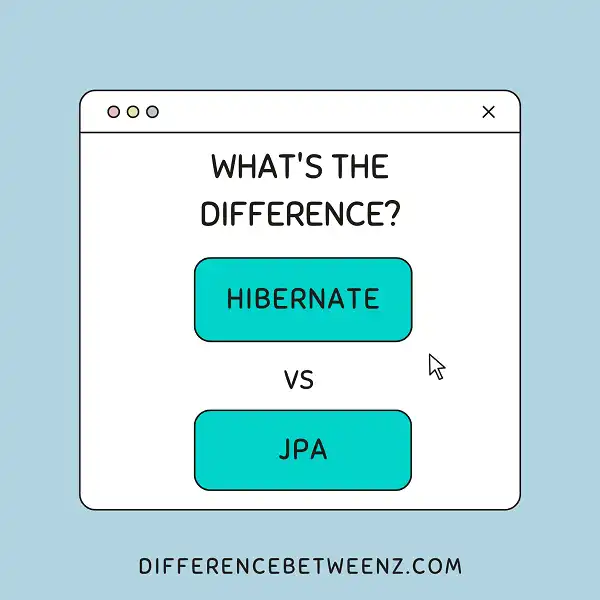Hibernate and JPA are two of the most popular Java Persistence frameworks. They both provide object-relational mapping capabilities, but they differ in some important ways. In this blog post, we’ll take a look at the key differences between Hibernate and JPA. We’ll also discuss which framework might be a better fit for your specific application needs.
What is Hibernate?
Hibernate is a high-performance Object/Relational persistence and query service which is compliant with the EJB 3.0 specification and Hibernate Annotations. Hibernate makes use of an extended version of the well-known Java Hibernate library. Hibernate provides a powerful, sophisticated caching mechanism for the efficient retrieval of cached objects and collections.
- Hibernate also offers pluggable connection pooling to reduce resource contention. Hibernate generates SQL calls on-the-fly and relieves the programmer from worrying about Manual ResultSet handling and conversion from Java types to SQL types.
- By mapping database tables to classes, Hibernate reduces lines of code and makes complex joins unnecessary. Hibernate efficiently handles dirty checking, lazy loading, and transactions.
- Hibernate is used in projects ranging from small-scale data persistence solutions for individual applications to large-scale enterprise solutions. Hibernate has been extremely successful in implementing object/relational persistence in Java applications.
Hibernate’s popularity is due to its lightweight (it has a minimal memory footprint), its ease of use (it requires minimal configuration), its flexibility (it can be easily extended to support new features), and its excellent performance (it uses intelligent algorithms to minimize database access). Hibernate supports mutable and immutable objects, inheritance, polymorphism, composition, and association. Hibernate also supports lazy loading, eagerly loading, and batch fetching of associations.
What is JPA?
JPA is the Java Persistence API, a specification for accessing, persisting, and managing data between Java objects/classes and a relational database. JPA is a part of the Java Enterprise Edition (Java EE) platform. JPA can be used with any application server or Object/Relational Mapping (ORM) tool. JPA provides several benefits for enterprise Java applications:
– JPA is a lightweight solution for ORM in JavaEE applications.
– JPA does not require an application server to run.
– JPA can be used in any JVM-based application, including Java SE applications.
– JPA integrates well with other frameworks and technologies in the Java EE platform, such as the Java Transaction API (JTA), the Java Message Service (JMS), and EnterpriseJavaBeans (EJB).
– JPA provides a standard interface for accessing data in a relational database. JPA can be used with any relational database that supports an appropriate JDBC driver.
JPA has been successfully used with databases such as IBM DB2, Microsoft SQL Server, MySQL, Oracle Database, PostgreSQL, and Sybase ASE. In addition, JPA can be used with non-relational data sources such as Apache Derby and HSQLDB.
persistence providers that implement the JPA specification include EclipseLink MOXy, Hibernate ORM, OpenJPA, and DataNucleus AccessPlatform. These providers are available under various commercial and open source licenses.
Difference between Hibernate and JPA
Hibernate and JPA are two popular frameworks for persistence in Java. Hibernate is an ORM (Object Relational Mapping) framework, which maps relational entities into Java objects and vice versa. Hibernate also provides some features for querying data, taking care of dirty checking, lazy loading, etc.
- JPA (Java Persistence API) on the other hand is only a specification and it doesn’t provide any implementations. Hibernate implements JPA specification and thus provides all features defined in JPA specification like mapping entities to relational database tables. Hibernate can be used as a standalone framework or with other frameworks like Spring etc.
- Hibernate has its own query language HQL, which is very similar to SQL. But HQL is not case sensitive like SQL, HQL handles association between objects automatically, and HQL supports inheritance also. HQL is portable across different databases, unlike SQL.
- JPA provides support for Criteria API for querying purposes which is a very powerful and flexible alternative to HQL. JPA also supports some annotations for hibernating specific features like caching, lazy loading, etc but these annotations are not portable across different JPA implementations.
Conclusion
Hibernate and JPA are two different technologies that can be used to persist data in a Java application. Hibernate is more popular, but both have their advantages and disadvantages. If you’re trying to choose between the two, it’s important to understand what each one does so you can make an informed decision.


